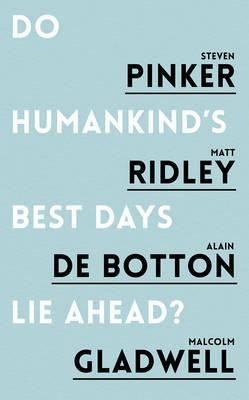Do Humankind's Best Days Lie Ahead?
`It's just a brute fact that we don't throw virgins into volcanoes any more. We don't execute people for shoplifting a cabbage. And we used to.' -Steven Pinker
`The idea that because things have gotten better in the past they will continue to do so in the future is a fallacy I would have thought confined to the lower reaches of Wall Street.' -Malcolm Gladwell
In a world driven by technology and globalization, is humanity approaching a Golden Age or is the notion of progress a Western delusion? Four of the world's most renowned thinkers take on one of the biggest debates of the modern era...
Progress. It is one of the animating concepts of the modern era. From the Enlightenment onwards, the West has had an enduring belief that through the evolution of institutions, innovations, and ideas, the human condition is improving. This process is supposedly accelerating as new technologies, individual freedoms, and the spread of global norms empower individuals and societies around the world. But is progress inevitable? Its critics argue that human civilization has become different, not better, over the last two and a half centuries. What is seen as a breakthrough or innovation in one period becomes a setback or limitation in another. In short, progress is an ideology not a fact; a way of thinking about the world as opposed to a description of reality.
In the seventeenth semi-annual Munk Debates, which was held in Toronto on November 6, 2015, pioneering cognitive scientist Steven Pinker and best-selling author Matt Ridley squared off against noted philosopher Alain de Botton and best-selling author Malcolm Gladwell to debate whether humankind’s best days lie ahead.
| Author | Stephen Pinker; Matt Ridley; Alain De Botton; Malcolm Gladwell |
|---|---|
| Publisher | Oneworld Publications |
| Place | London |
| Year | 2016 |
| ISBN | 9781786070760 |
| Binding | Paperback |
| Condition | As New |
| Comments | Dimensions: 178 x 111 x 11mm (L x W x T) |
How we describe the condition of our books
We are very proud of the condition of the books we sell (please read our testimonials to find out more!)
New: Exactly as it says.
As New: Pretty much new but shows small signs of having been read; inside it will be clean without any inscriptions or stamps; might contain a remainder mark.
Very Good: Might have some creases on the spine; no hard cracks; maybe slight forward lean and short inscription inside; perhaps very minor bumping on the corners of the book; inside clean but the page edges might be slightly yellowed.
Good: A few creases on the spine, perhaps a forward lean, bumping on corners or shelfwear; maybe an inscription inside or some shelfwear or a small tear or two on the dustjacket; inside clean but page edges might be somewhat yellowed.
Fair: In overall good condition, might have a severe forward lean to the spine, an inscription, bumping to corners; one or two folds on the covers and yellowed pages; in exceptional cases these books might contain some library stamps and stickers or have neat sticky tape which was used to fix a short, closed tear.
Poor: We rarely sell poor condition books, unless the books are in demand and difficult to find in a better condition. Poor condition books are still perfect for a good read, all pages will be intact and none threatening to fall out; most probably a reading copy only.


